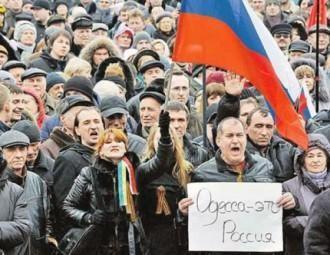A Belarusan involved in funding separatists in Ukraine was detained

The Security Service of Ukraine arrested two Russian citizens and a Belarusan citizen, who were funding AntiMaidan in Odessa and coordinating mass demonstrations against Ukrainian authorities.
It has been established that those individuals came to Odessa late June 2014, with a special task of the Russian intelligence – to organize protest actions in order to destabilize the socio-political situation in the region.
According to the press service of the Security Service of Ukraine, by using the tactics of rumors and disinformation, playing upon dissatisfaction of certain citizens with social problems, Russian malefactors through their contacts among local separatists prepared radicals for participation in actions, produced and distributed propaganda materials calling for protests, urged to mass riots.
“Bribing the corrupt media, offenders spread panic using news feeds, publications and TV stories”, - added the press service of the Security Service of Ukraine, marking that offenders had to send photo reports to their handlers after the rallies.
“It has been also established, that those “guest performers” financed the so-called AntiMaidan at the Kulikovo Pole in Odessa on the instructions of the foreign side”, - summed up in the press service.
The unnamed men were accused of, among other, inciting mass disorder and paying media outlets for running critical reports about Ukraine's current government and pro-Russian reports.
According to BelaPAN, the Belarusan foreign ministry has not yet received formal notification from the Ukrainian authorities of the Belarusan suspect's arrest, said Dzmitry Mironchyk, spokesman for the ministry, earlier on July 7.
-
03.01
-
07.10
-
22.09
-
17.08
-
12.08
-
30.09



























